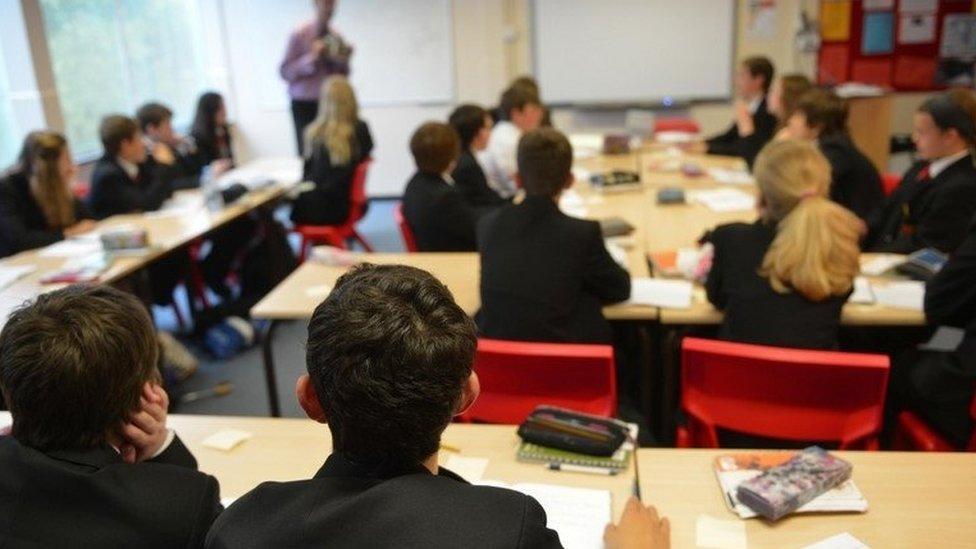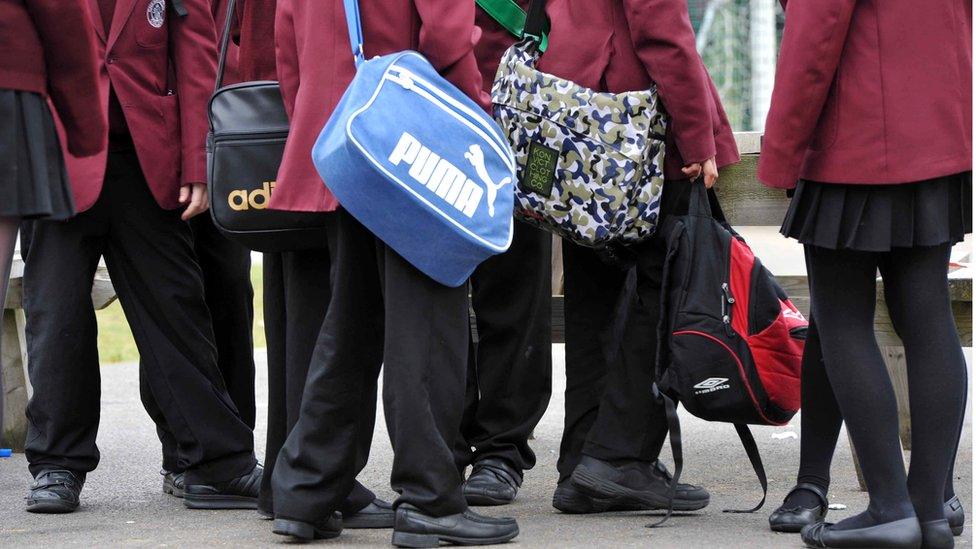What does Curriculum for Excellence mean for pupils, teachers and parents?
- Published

How Scottish schools are performing has come under the spotlight as part of a review of the Curriculum for Excellence (CfE).
But what does the CfE mean for pupils, teachers and parents? BBC Scotland's education correspondent Jamie McIvor tackles the big questions.

Q1 Just what is Curriculum for Excellence?
Curriculum for Excellence is a term which is widely heard but often misunderstood or misused. For a start, it is not actually a curriculum - teachers in Scotland are not told what they have to teach, how they have to teach it or how long they have to spend on each subject. The changes it brought about can be split into two: the impact on primary schools and the first three years of secondary education, and the effect on the last three years of secondary school.
Curriculum for Excellence started to be introduced into primary schools and the early years of secondary schools in 2010. The aim, in a nutshell, was to give teachers more freedom and flexibility over just what to teach and how - then judge by the long-term results. In primary schools, the changes were largely evolutionary. Many teachers chose to use their own skill and judgement to fit numeracy, literacy and other basics into wider projects - for instance, a class project on the Romans may include language, science, maths, music and other topics. This "project-based learning" had once been popular but then went out of fashion. In secondary schools, the main changes began in 2013 when new qualifications started to be introduced, principally to replace Standard Grades. This was a more radical and difficult change.
Q2 Is Curriculum for Excellence itself controversial?
It depends what you mean by controversial. The foundations were laid by Labour and the Liberal Democrats, teachers were heavily involved in shaping the changes and they were implemented under the SNP. The Conservatives also support Curriculum for Excellence. Political rows have tended to be about how well-implemented the changes have actually been and whether they were working rather than their underlying aims. Parental concerns have usually been about decisions made by individual schools or local authorities. However, the changes to the exam system and secondary qualifications have led to more widespread problems and rows. Read the later questions for more information.

Q3 But the headlines are full of rows over education. What about teacher numbers, class sizes, school buildings, opening hours and education budgets?
These are important, but distinct, issues from the Curriculum for Excellence. It is important to separate Curriculum for Excellence itself from other aspects of education policy - it refers to a specific programme of change in Scottish education, not wider education policy.
Q4 So is it getting results? Is attainment improving in primaries and early secondaries?
The best way to get a sense of the performance of younger children across Scotland is from the national surveys on numeracy and literacy. They both suggest limited progress is being made and that performance is even declining in some areas. However, experts argue there still is not enough data from these tests to draw long-term trends.
The Scottish government commissioned a report from the OECD to examine how Curriculum for Excellence was going. The report was overwhelmingly positive but drew attention to some problems and challenges - some of which actually predate Curriculum for Excellence. For example, it highlighted the falling levels of achievement in mathematics and noted the declining number of children with the best reading ability. It also highlighted challenges facing secondary schools - for instance, how many teenagers say they do not like school.
The Scottish government would also highlight improving Higher results and the falling number of teenagers who aren't in education, work or training as policy successes. However, it is hard to say just how much of a part Curriculum for Excellence has played in this.
Q5 I've heard that Curriculum for Excellence is being renamed and relaunched. Is it?
No. The OECD did suggest the name could be better but there are no plans just now to change it. Nor are there any plans for a relaunch or radical changes. The Scottish government's main policy aim just now is to try to raise attainment for all children and close the gap between how well children from relatively rich and poor backgrounds do at school. More details of its National Improvement Framework are due in the new year. However, this will work within the existing system rather than replace or change it.
An important part of the framework will be new assessments in P1, P4, P7 and S3. They will be consistent across Scotland and replace the different tests done by many local authorities. The aim is to help improve the data on what schemes to raise attainment work.
There are, however, genuine concerns within the profession about this. The fear is the data from the tests could be used to judge schools and produce unofficial "league tables". This in turn could lead to pressure on teachers to "teach to the test" - undermining the freedom of Curriculum for Excellence offers. However, the largest teachers' union the EIS is confident its concerns are being listened to by the government and that a workable scheme can be put into practice.

Q6 Should teachers have quite so much freedom and flexibility over what they should teach and how?
That is an interesting philosophical point. There has never been a prescriptive curriculum in Scotland - indeed in the 1980s the National Curriculum, a flagship policy of Margaret Thatcher's government, was not introduced in Scotland. It is commonly accepted in Scotland that it would be inappropriate for government ministers or civil servants to try to play a proactive part in shaping lessons and courses. Teaching, it is said, operates by trust, consent and agreement. (Of course, there are school inspections and if a school's performance was unsatisfactory it should be highlighted by Education Scotland. The General Teaching Council would deal with any concerns about the competency or performance of individual teachers.)
Q7 So what about the new qualifications and exams in secondary schools?
Standard Grades and Intermediates have been scrapped. They have been replaced by National 4s and 5s. Meanwhile, Highers and Advanced Highers have been revamped. The changes were designed to fit the qualifications system and "senior phase" of secondary school in with the changes to the rest of the school system. Broadly speaking, the profession backed the changes themselves and the rows were over their implementation - there were concerns over workload, bureaucracy, stress and over-assessment.
Q8 But what about the rows at some schools over the number of qualifications students sit?
It used to be normal practice for an academically-able child to sit 7 or 8 O Grades or Standard Grades in S4, then study for 4 or 5 Highers in S5. They might then spend S6 studying for more Highers or Advanced Highers or re-sitting any Highers they failed or got a disappointing mark in. The system is now designed to be more flexible - the emphasis is on what a student leaves school with rather than what they have achieved by a particular stage.
There have been local rows over just how many National 5s students can study in S4 at some schools - there is no nationally-set number. Some parents argued that if their children did not have the chance to sit seven or eight, they were effectively pre-selecting their Highers a year early or feared they might not have the same breadth of qualifications as they had.
A growing number of schools are also keen to encourage academically able children to bypass National 5s and spend S4 and S5 working towards their Highers.
Occasionally though, serious local rows erupt over the decisions made by individual schools - especially if they appear to reduce flexibility. At Hermitage Academy in Helensburgh, many parents protested because no S4 students had the chance to obtain qualifications. Ultimately, rows like these are about decisions made by schools and councils - not national policies. Whether schools should have these freedoms to begin with though is a separate argument.
- Published15 December 2015

- Published8 December 2015
